Unit 7 Will people have robots? Section A Grammar-3c (共19张PPT)
文档属性
| 名称 | Unit 7 Will people have robots? Section A Grammar-3c (共19张PPT) |

|
|
| 格式 | pptx | ||
| 文件大小 | 5.6MB | ||
| 资源类型 | 教案 | ||
| 版本资源 | 人教新目标(Go for it)版 | ||
| 科目 | 英语 | ||
| 更新时间 | 2023-11-29 00:00:00 | ||
图片预览

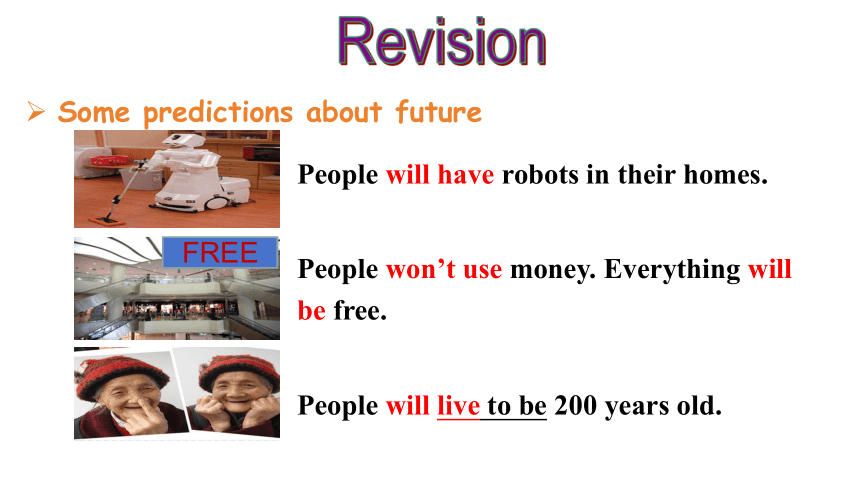
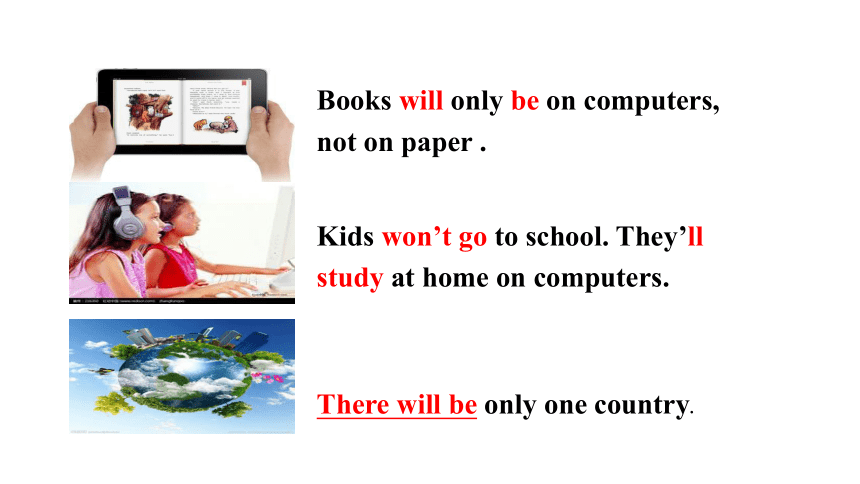
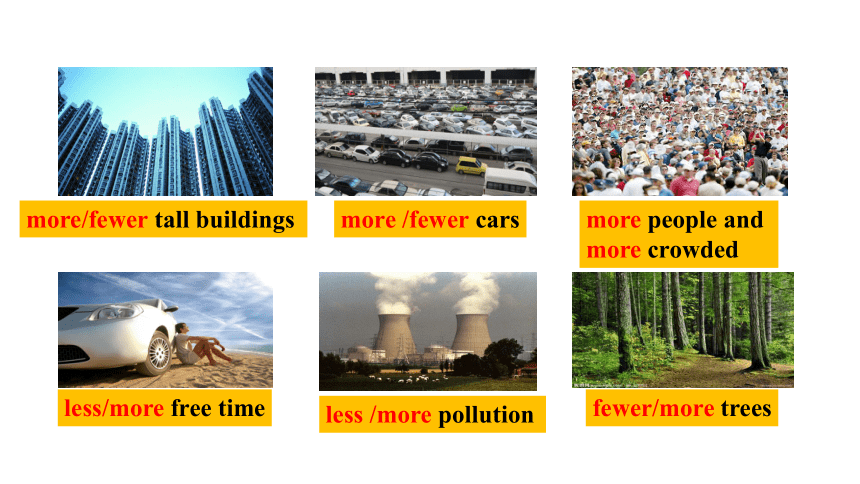
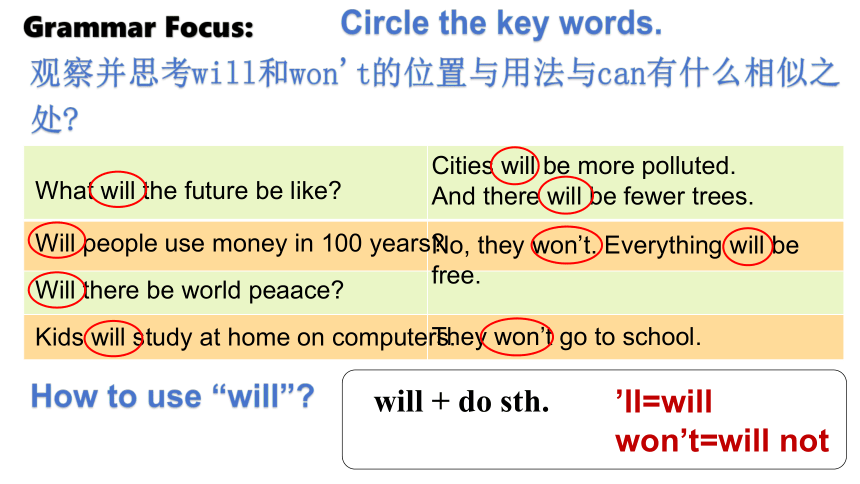
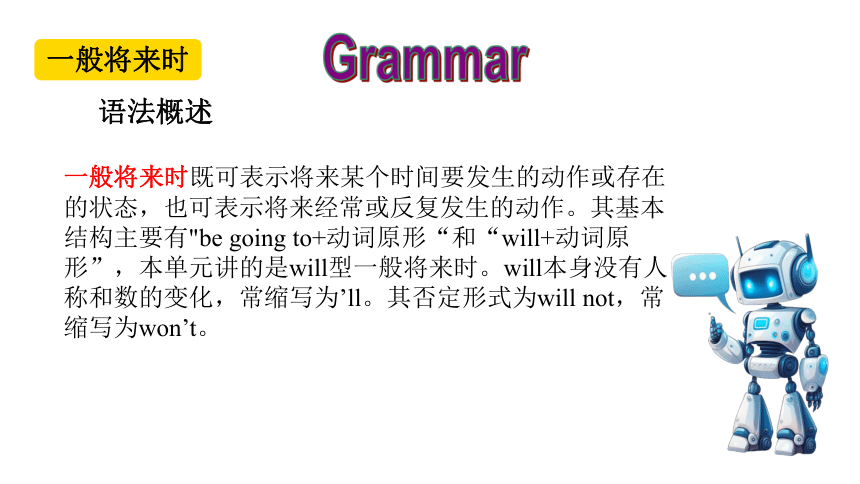
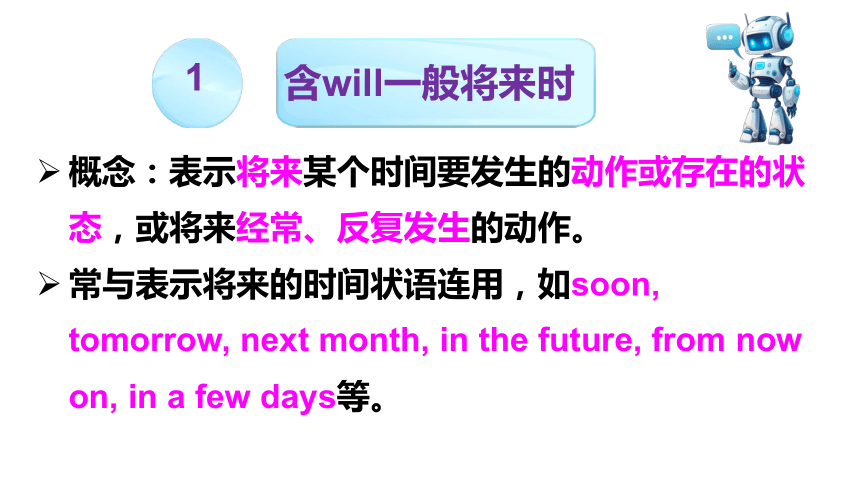
文档简介
(共19张PPT)
Unit 7
Will people have robots
SectionA
(GF-3C)
Revision
Some predictions about future
People will have robots in their homes.
FREE
People won’t use money. Everything will be free.
People will live to be 200 years old.
Books will only be on computers, not on paper .
Kids won’t go to school. They’ll study at home on computers.
There will be only one country.
more/fewer tall buildings
more /fewer cars
more people and more crowded
less/more free time
less /more pollution
fewer/more trees
Grammar Focus:
观察并思考will和won't的位置与用法与can有什么相似之处
What will the future be like
Cities will be more polluted.
And there will be fewer trees.
Will people use money in 100 years
Will there be world peaace
Kids will study at home on computers.
No, they won’t. Everything will be free.
They won’t go to school.
Circle the key words.
How to use “will”
’ll=will
won’t=will not
will + do sth.
Grammar
一般将来时
一般将来时既可表示将来某个时间要发生的动作或存在的状态,也可表示将来经常或反复发生的动作。其基本结构主要有"be going to+动词原形“和“will+动词原形”,本单元讲的是will型一般将来时。will本身没有人称和数的变化,常缩写为’ll。其否定形式为will not,常缩写为won’t。
语法概述
含will一般将来时
概念:表示将来某个时间要发生的动作或存在的状态,或将来经常、反复发生的动作。
常与表示将来的时间状语连用,如soon, tomorrow, next month, in the future, from now on, in a few days等。
1
肯定句:
否定句:
主语 + will + v.原形 + 其他.
主语 + will not/won’t + v.原形 + 其他.
1. 句式结构
例句:他们今天下午将去踢足球。
They will play football this afternoon.
他们今天下午不去踢足球。
They won’t play football this afternoon.
一般疑问句:
Will +主语 + v.原形 + 其他
肯定回答:
Yes, 主语 + will.
No, 主语 + won’t.
否定回答:
例句:他们今天下午将去踢足球吗
—Will they play football this afternoon
是的,他们将去。/ 不,他们不去。
—Yes, they will. / No, they won’t.
特殊疑问句:
特殊疑问词 + will +主语 + v.原形 + 其他
例句:他们什么时候去踢足球
When will they play football
注意:
当主语为I或we时,也可以用“ shall+动词原形”表示一般将来时,shall not缩写为shan’t。
be going to往往表示将要发生的动作或安排,特别是打算、计划、决定要做的事。
一般将来时(will)常用来客观陈述将来某个时间要发生的动作或存在的状态(will作为情态动词常表意愿)。
She is going to lend us her book. 她打算把书借给我们。
She will lend us her book. 她将会把书借给我们。
2.will 和 be going to 的区别
3. there be句型的一般将来时
There will be+主语+其他.
there be句型
There is/ are going to be+主语+其他.
例句:今天晚上将会有一场篮球比赛。
There will be a basketball game tonight.
=There is going to be a basketball game tonight.
In the future, there will be ______fresh water because there will be______ pollution in the sea.
2. In 100 years, there will be______ cars because there will be ______ people in the cities.
less
more
more
more
Fill in the blanks with more, less or fewer.
3a
3. There will be_______ jobs for people because
_______ robots will do the same jobs as people.
4. I think there will be______ cities because people will build_______ buildings in the country.
5. In 50 years, people will have ______free time because there will be _____ things to do.
fewer
more
more
more
fewer
more
Complete the predictions with what you think will happen.
Kids study at school now. In 100 years,
___________________________________
2. I sometimes see blue skies in my city, but
in the future _________________________
__________________________________
Kids will study at home on computers
I will often see the blue skies,
because there will be less pollution.
3b
4. Families usually spend time together on
weekends, but maybe in 200 years
____________________________________
_____________________________________
3. People now usually live to be about 70-80
years old, but in the future
_________________________________
People will live to be 200 years old.
Everyday can be weekend, because
they have robots to do everything.
I think there will be more tall buildings, and there will be fewer cars and more buses.
Draw a picture of what you think a city in the future will be like. Then describe it to the class.
3c
What can you see in this picture
50 years later
There will be more people.
There will be fewer trees.
There will be more pollution.
There will be more buildings.
There will be more cars.
There will be less fresh air.
There will be…将会有……
Changes
Summary
含will一般将来时的概念与句式结构
“will+v.原形”与“be going to+v.原形”的区别
there be句型的一般将来时
现在进行时表将来
一般现在时表将来
辨析more, fewer, less
Unit 7
Will people have robots
SectionA
(GF-3C)
Revision
Some predictions about future
People will have robots in their homes.
FREE
People won’t use money. Everything will be free.
People will live to be 200 years old.
Books will only be on computers, not on paper .
Kids won’t go to school. They’ll study at home on computers.
There will be only one country.
more/fewer tall buildings
more /fewer cars
more people and more crowded
less/more free time
less /more pollution
fewer/more trees
Grammar Focus:
观察并思考will和won't的位置与用法与can有什么相似之处
What will the future be like
Cities will be more polluted.
And there will be fewer trees.
Will people use money in 100 years
Will there be world peaace
Kids will study at home on computers.
No, they won’t. Everything will be free.
They won’t go to school.
Circle the key words.
How to use “will”
’ll=will
won’t=will not
will + do sth.
Grammar
一般将来时
一般将来时既可表示将来某个时间要发生的动作或存在的状态,也可表示将来经常或反复发生的动作。其基本结构主要有"be going to+动词原形“和“will+动词原形”,本单元讲的是will型一般将来时。will本身没有人称和数的变化,常缩写为’ll。其否定形式为will not,常缩写为won’t。
语法概述
含will一般将来时
概念:表示将来某个时间要发生的动作或存在的状态,或将来经常、反复发生的动作。
常与表示将来的时间状语连用,如soon, tomorrow, next month, in the future, from now on, in a few days等。
1
肯定句:
否定句:
主语 + will + v.原形 + 其他.
主语 + will not/won’t + v.原形 + 其他.
1. 句式结构
例句:他们今天下午将去踢足球。
They will play football this afternoon.
他们今天下午不去踢足球。
They won’t play football this afternoon.
一般疑问句:
Will +主语 + v.原形 + 其他
肯定回答:
Yes, 主语 + will.
No, 主语 + won’t.
否定回答:
例句:他们今天下午将去踢足球吗
—Will they play football this afternoon
是的,他们将去。/ 不,他们不去。
—Yes, they will. / No, they won’t.
特殊疑问句:
特殊疑问词 + will +主语 + v.原形 + 其他
例句:他们什么时候去踢足球
When will they play football
注意:
当主语为I或we时,也可以用“ shall+动词原形”表示一般将来时,shall not缩写为shan’t。
be going to往往表示将要发生的动作或安排,特别是打算、计划、决定要做的事。
一般将来时(will)常用来客观陈述将来某个时间要发生的动作或存在的状态(will作为情态动词常表意愿)。
She is going to lend us her book. 她打算把书借给我们。
She will lend us her book. 她将会把书借给我们。
2.will 和 be going to 的区别
3. there be句型的一般将来时
There will be+主语+其他.
there be句型
There is/ are going to be+主语+其他.
例句:今天晚上将会有一场篮球比赛。
There will be a basketball game tonight.
=There is going to be a basketball game tonight.
In the future, there will be ______fresh water because there will be______ pollution in the sea.
2. In 100 years, there will be______ cars because there will be ______ people in the cities.
less
more
more
more
Fill in the blanks with more, less or fewer.
3a
3. There will be_______ jobs for people because
_______ robots will do the same jobs as people.
4. I think there will be______ cities because people will build_______ buildings in the country.
5. In 50 years, people will have ______free time because there will be _____ things to do.
fewer
more
more
more
fewer
more
Complete the predictions with what you think will happen.
Kids study at school now. In 100 years,
___________________________________
2. I sometimes see blue skies in my city, but
in the future _________________________
__________________________________
Kids will study at home on computers
I will often see the blue skies,
because there will be less pollution.
3b
4. Families usually spend time together on
weekends, but maybe in 200 years
____________________________________
_____________________________________
3. People now usually live to be about 70-80
years old, but in the future
_________________________________
People will live to be 200 years old.
Everyday can be weekend, because
they have robots to do everything.
I think there will be more tall buildings, and there will be fewer cars and more buses.
Draw a picture of what you think a city in the future will be like. Then describe it to the class.
3c
What can you see in this picture
50 years later
There will be more people.
There will be fewer trees.
There will be more pollution.
There will be more buildings.
There will be more cars.
There will be less fresh air.
There will be…将会有……
Changes
Summary
含will一般将来时的概念与句式结构
“will+v.原形”与“be going to+v.原形”的区别
there be句型的一般将来时
现在进行时表将来
一般现在时表将来
辨析more, fewer, less
同课章节目录
- Unit 1 Where did you go on vacation?
- Section A
- Section B
- Unit 2 How often do you exercise?
- Section A
- Section B
- Unit 3 I'm more outgoing than my sister.
- Section A
- Section B
- Unit 4 What's the best movie theater?
- Section A
- Section B
- Unit 5 Do you want to watch a game show?
- Section A
- Section B
- Unit 6 I'm going to study computer science.
- Section A
- Section B
- Unit 7 Will people have robots?
- Section A
- Section B
- Unit 8 How do you make a banana milk shake?
- Section A
- Section B
- Unit 9 Can you come to my party?
- Section A
- Section B
- Unit 10 If you go to the party, you'll have a grea
- Section A
- Section B
